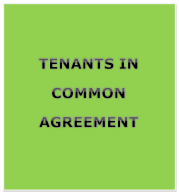Purchasing property with another person or group is a great way to get into the property market and start investing.
Whether you’re purchasing an investment property or in the market for your dream home, buying a property with others allows many people the opportunity to enter the property market who may otherwise not have had the means (or the funds) to do so.
Buying property with other like-minded people means sharing costs such as:
- deposit,
- mortgage costs,
- property insurance,
- interest and
- property maintenance costs.
while allowing you to reap the benefits of owning a property sooner.
How to facilitate Co-ownership
It is usual for co-owners to hold property as “tenants in common”. This is a legal term used to describe a certain type of joint ownership. It means that each owner holds a specified interest in the “whole” of the land, without being exclusively entitled to a specific part ie. there is no imaginary line down the middle of the property separating one persons share from the other, rather each owner has an interest in the whole of the property. This interest can be dealt with (for example, can be sold) by each owner.
If a tenant in common dies, their interest in the property becomes part of their estate to be distributed under their Will. This is in contrast to a “joint tenant” whose share in property will automatically pass to the surviving joint tenant on death.
Generally, people co-purchase property with another person whom they trust or with whom they share similar aspirations and plans for the property.
Get it in Writing
It is recommended that the parties record the terms of their co-ownership with a written agreement. Due to the complex nature of property ownership and the many issues that may arise, having an agreement in place prompts the parties to think through the transaction and the many variables that may occur over time. For example;
- What if someone wants to sell their share?
- What if one owner is facing financial difficulty and cannot keep up with their financial obligations?
- What happens if an owner dies?
Discussing these issues and agreeing – both about the day to day responsibilities and issues as well as the larger, overall goal – helps ensure that all parties are in agreement and on the same track. It also helps minimise any unexpected issues that may occur and give the parties an agreed plan to work with if such issues occur.
A tenant in common agreement is a private agreement between co-owners. It should reflect the parties own unique arrangement and address issues such as:-
- Percentage ownership of each party and how this is calculated;
- Responsibility for costs related to the property;
- Mortgage set up and bank accounts;
- What happens if one party defaults on mortgage payments;
- What happens if one party wants to sell and the other party (or parties) does not;
- Determining a valuation if the property is being sold;
- Putting exit plans in place;
- Property insurance requirements;
- Maintenance and upkeep;
- How the property will be used – investment, renovation, residence, etc.
- Protection if a party dies – life insurance
- Division of profits
- Apportionment of debts/liabilities
Due to the large amount of resources that the parties have committed to the joint property and the costs involved, it is recommended that co-owners take this simple step to protect their business relationship and their valuable asset.
See Tenants In Common Agreement
also see Co Ownership Agreements
 Looking for House Rental Tenancy Agreements – we have easy-to-use kits to make renting your investment property easier. Available for each Australian State – ACT, NSW, NT, QLD, SA, TAS, VIC, WA,
Looking for House Rental Tenancy Agreements – we have easy-to-use kits to make renting your investment property easier. Available for each Australian State – ACT, NSW, NT, QLD, SA, TAS, VIC, WA,


